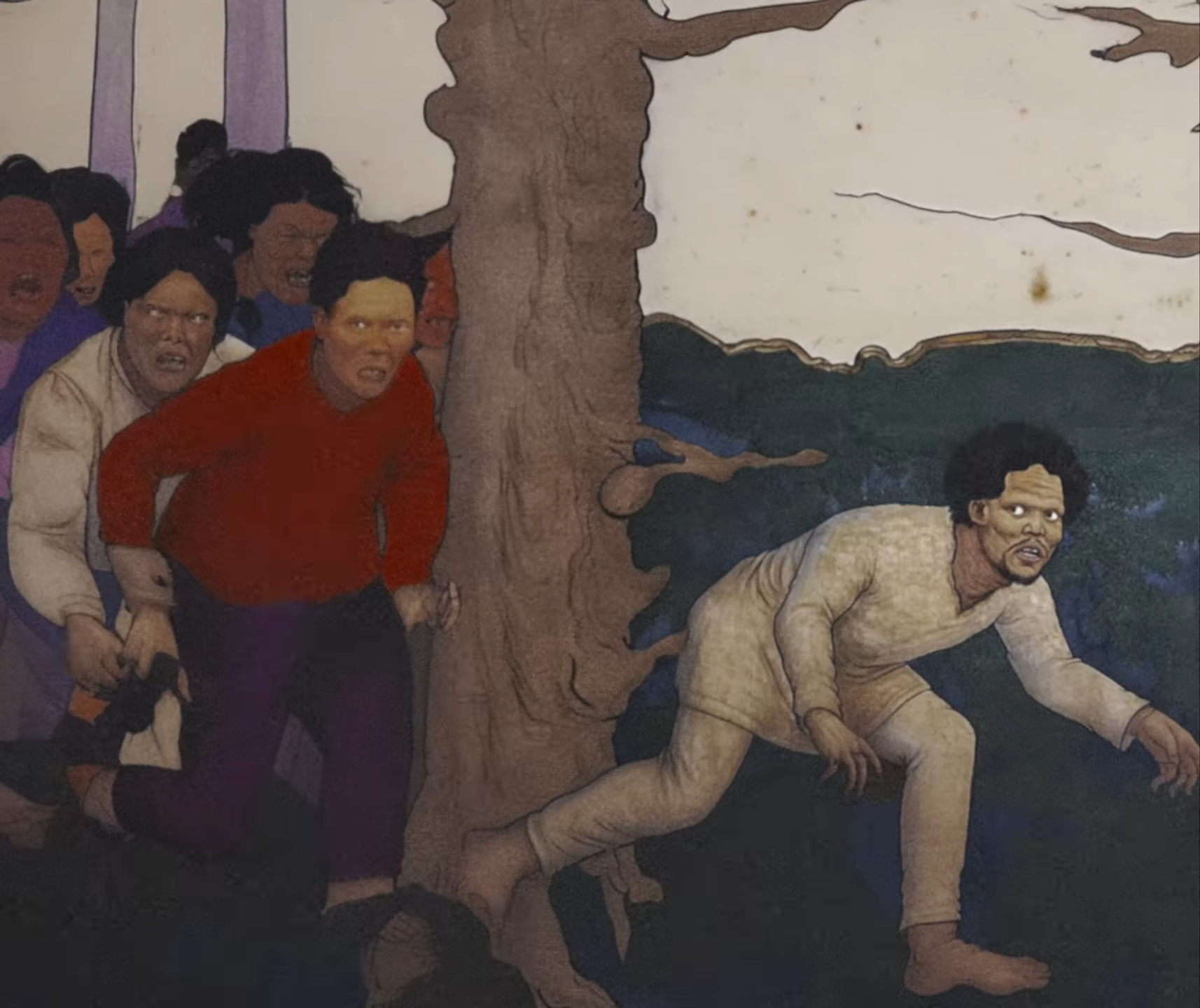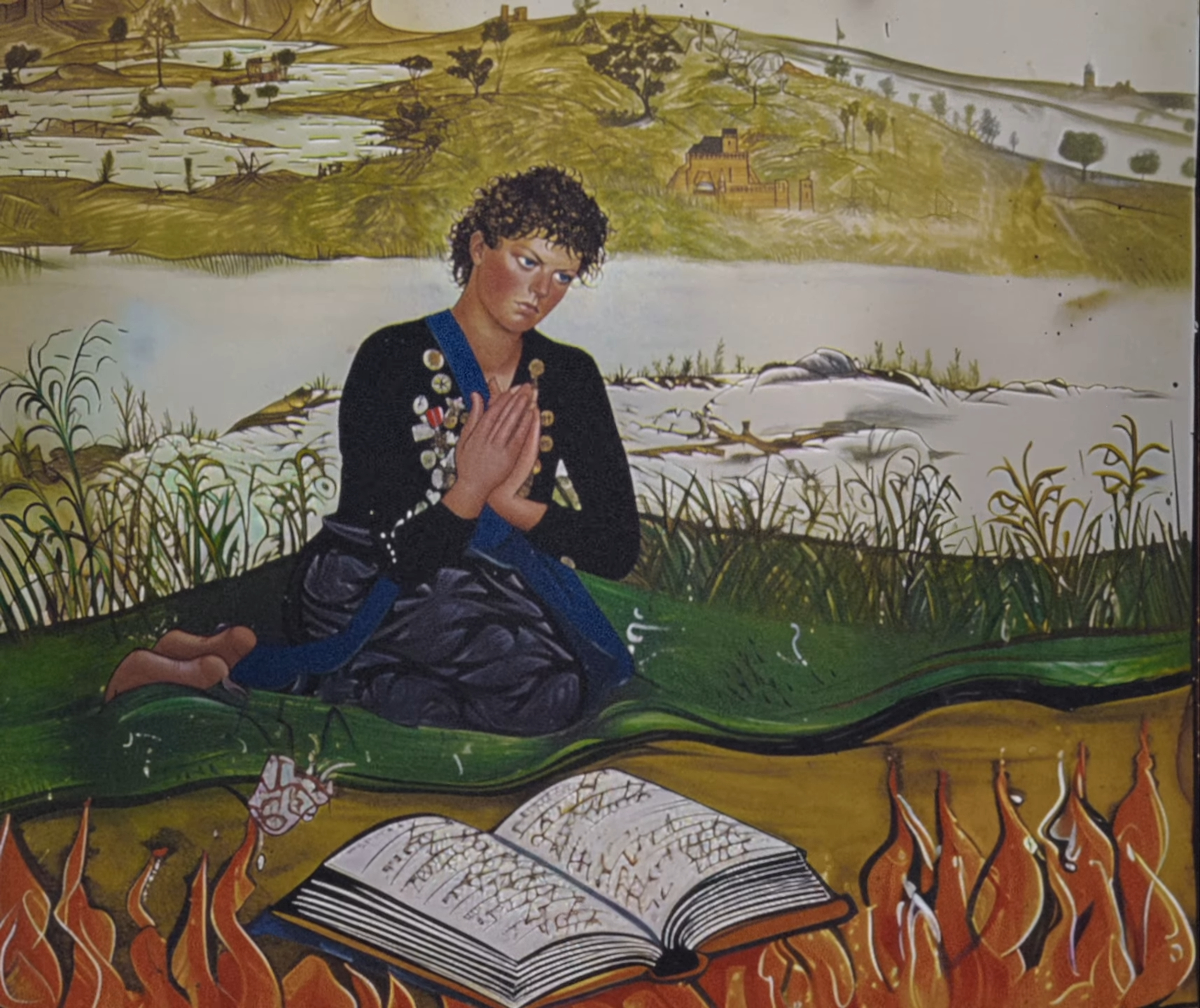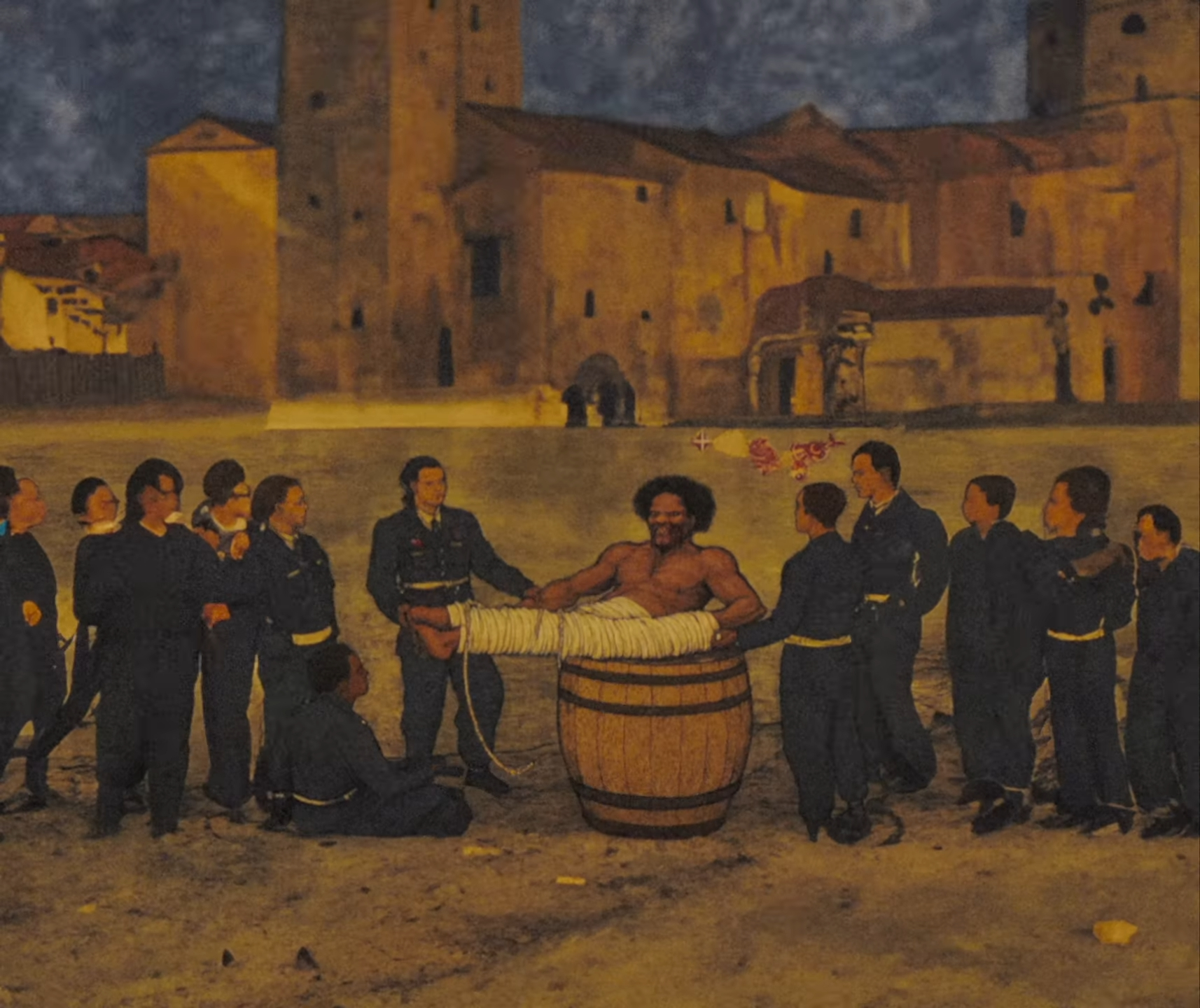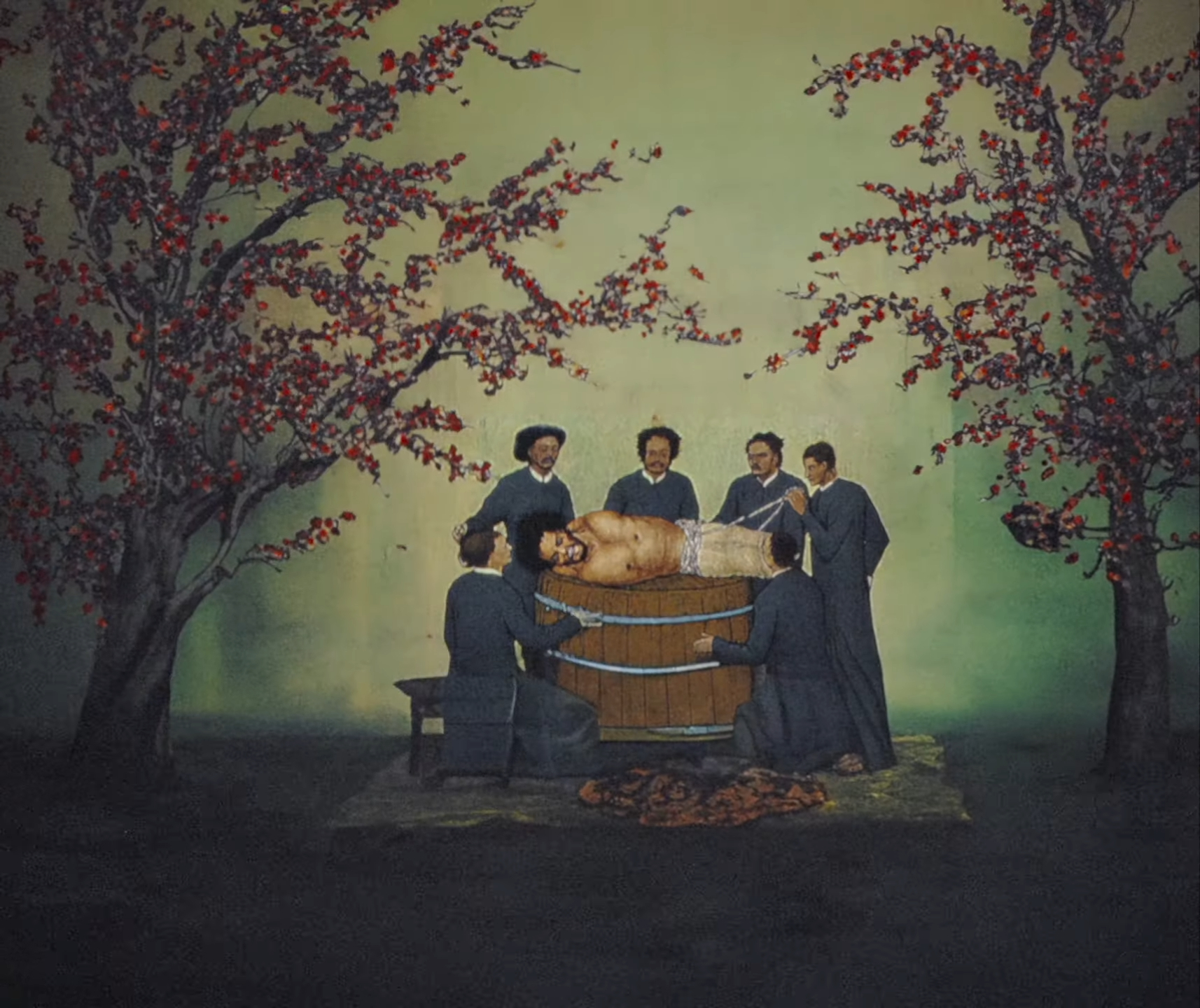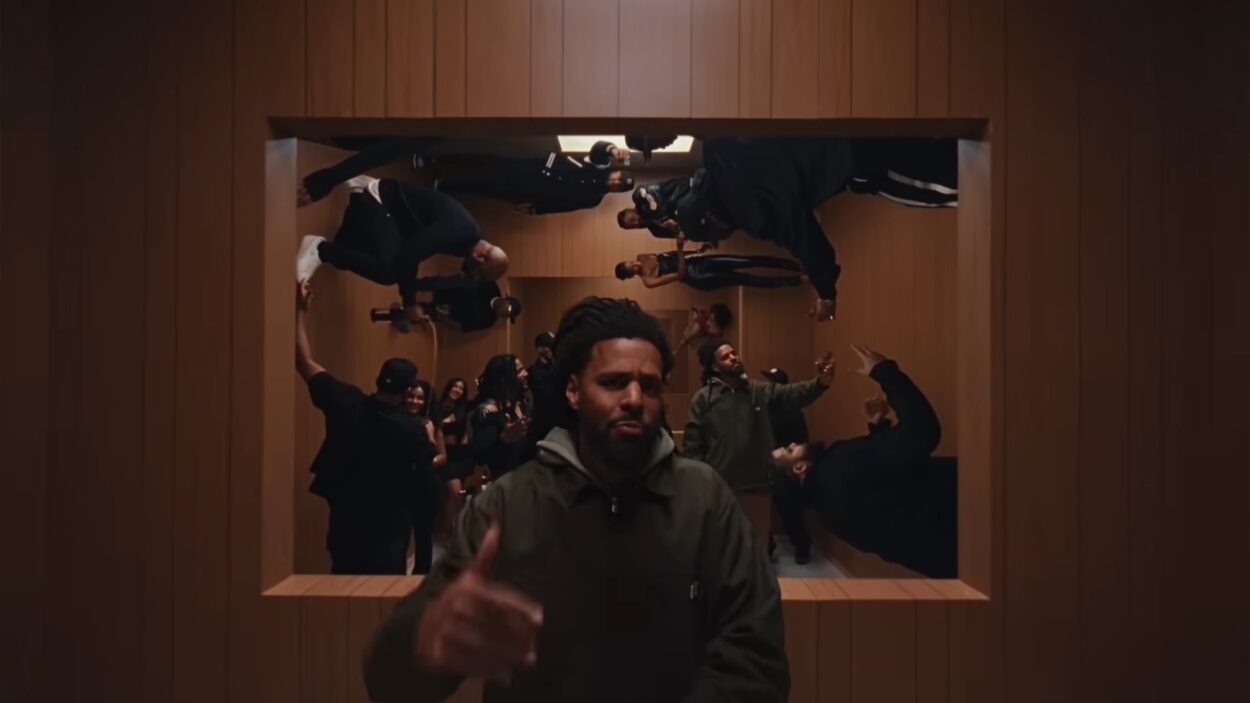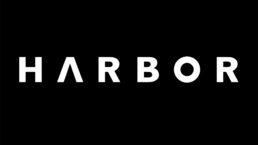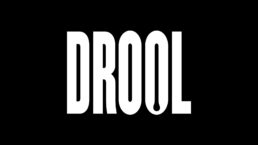The film for Driving Round Looking for Unknown is emotional. Underlying the absurdity is a believable tenderness which speaks to us, hooks us in. How did you start the narrative?
I directed this piece together with my dear friend Simon Becks. I suppose the end narrative is a kind of Russian doll, based on an intuitive feeling of alienation we sensed in the track, and perhaps in modern life in general. A sense of not belonging. And what belongs less than a monster? We wanted to place that displacement within another displacement, which led us into this strange medieval world that you can’t quite place but that still feels familiar. Then there was the core action of it being dragged behind a carriage, heading somewhere. To where? We have no idea. But I guess that’s the point.
One of my favourite scenes is “Stop the coach I need a pee”. (Something i always want to shout out on the Stanstead express coach.) What did you draw on for natural dialogue?
That was a moment we were strangely protective of. It’s funny, but also deeply human. Those odd, slightly embarrassing interruptions in life are what make the absurdity relatable, so it made sense to include it. In general, these moments are quite intuitive, like quick thoughts that develop in a tête-à-tête of having fun. I feel that in films from, for example, Tarantino. Nothing makes perfect sense, but you sense the joy of the writers, and in that imperfection you often find something that feels more real and authentic than a perfectly plotted script.
The film is absurd. And it’s a huge production. How did you convince your producers to trust your vision – or was it easy?
We didn’t have much to convince with, two days, micro-budget, big ambitions. What helped was that people just wanted to jump in. It was one of those projects where the energy carried everyone along. The trust came less from grand promises and more from showing how precise we wanted to be in building this strange world, making sure it never tipped into parody or pastiche. That seriousness behind the absurdity convinced people.
Did you think of the plot in words or drawings? And was Driving a similar creative process as working on a commercial, say, for Nike?
It’s VERY different. A music video like this is a blank page and a doing an ad for Nike has barriers. Both fun and challenging in their own ways. I have to say that my creative process isn’t something that always work the same. But in general I’m looking for a hook. Something that gets me excited. Could be a picture. Could be a meme. But usually something visual. In the end these are not feature films but little visual reflections of a feeling, something that’s not easily described through words. I guess that’s universal in each process working as a director in these kind of mediums.
Do you need solitude to develop your work or do you prefer collaborating?
I prefer collaborating, as ideas just become better when you have someone to ping-pong with. And directing can be a solitary job. It’s nice to share the burden, though it comes with its own challenges. It gets personal quickly!! So there are some therapy-appropriated conversational techniques that come into play. In the end, directors are sensitive creatures, I guess. Then again, it also teaches you a lot. As a director, you’re expected to have a certain sense of confidence in your visions. But collaborating taught me to be more open, to understand that this vision can be wrong. It taught me to be more receptive to other ideas and to treat everything as a potential great idea.
What’s important – the emotion that your films convey or the message, the idea?
I am more interested in the emotion.
When you have no ideas where do you go for inspiration? Or is your head brimming with ideas all the time?
It really isn’t, unfortunately. I need to get into a certain mode to get creative. It requires a lot of coffee and nicotine, to say the least. Then usually the first six ideas are shit, stuff that’s just a rip-off of something I saw in the days before. After a while, though, another idea breaks through, which feels strangely ‘inappropriate,’ something I have no clue whether it’s terrible or great. Usually, that’s the thing I need to pursue, because the reason I can’t judge it properly is probably that I haven’t seen anything like it. But there’s a lot of force working against it. That’s the sheep in me, probably. Still, when I manage to convince myself, it usually turns into something great.
What were your early years like?
I got into directing about ten years ago, after my ambition to become a musician was wrecked by hearing damage. Probably a lifesaver, in hindsight, because it pulled me out of the party scene, which I needed more than I realized at the time.
The beginning of my career was tough. I was good at it, but terrible at believing in myself. Still, I managed to stick with it, pushing and pushing for any opportunity to make something new. It started with a music video in my hometown, The Hague. We applied for a grant that, luckily, nobody else applied for, so we won it. We had absolutely zero knowledge, just the excitement to make something. In the end, we rented two trucks full of tropical trees to put in my house and shot at night. Only later did we realize we needed light to actually see them. So in the video, you don’t see any of the trees, lol. You live and you learn.
From there, I slowly worked my way up, through internships at commercial production companies, editing cooking videos and all sorts of random stuff. I hated it at the time, but looking back, it’s what made me capable. It taught me the craft in every aspect. And I think that’s vital if you really want to make it.
Can you recall the moment when you realised you wanted to tell stories in film?
I’ve always watched a ton of movies. For me, it was a kind of therapy. I loved feeling a certain way and then finding a film that reflected that feeling back at me, but with its own twist. I suppose that’s still how I approach projects now. It’s always personal.
Did you go to art or film school or simply learn on the job?
The job. The job. The job!
What do you do to recharge after you’ve finished a major project?
When I get exhausted during a project, which, honestly, is usually the case, I can’t wait for it to be over. I start fantasizing about all the free time I’ll have, almost like a prisoner imagining life after jail. Sleep, friends, maybe even some kind of normal routine. But the strange thing is, it never takes long before I want to dive back in again. Like a soldier missing his war. It’s a paradox I still haven’t solved: the work drains me completely, yet without it I feel restless, unfinished. Maybe that’s just the nature of it. You’re constantly burning yourself out, only to find the urge to burn again.

